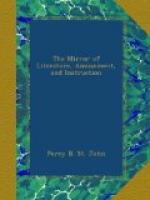’There are, who think the stature
all in all,
Nor like a hero if he is not tall.
The feeling sense all other wants supplies—
I rate no actor’s merit from his
size.
Superior height requires superior grace,
And what’s a giant with a vacant
face?’”
“Very true,” answered McCrab, “and, to follow up your theory, were I asked, what is an actor? I should answer,
’’Tis he who gives my breast
a thousand pains:
Can make me feel each passion that
he feigns;
Enrage, compose with more than magic art,—
With pity and with horror tear my heart.’
But, come; let me hear your reasons for believing that Hamlet ought to be a portly gentleman. I see you are ready with them.”
“I am,” said Stubbs, “and I’ll bet the receipts of the house, on my first appearance, against those of your next comedy, that I convince you I am right before I have done. Now, mark,—or, as Horatio says,
’Season your admiration for awhile,
With an attent ear, till I may deliver,
Upon the witness of these same pages,
This marvel to you.’
Ha! ha! that is apt,” continued Mr. Stubbs, with a simper.
“For God’s love, let me hear,” added McCrab—“I hope that’s apt too.”
“If,” said Mr. Stubbs, looking exceedingly grave, “if, I say, we take the first soliloquy of Hamlet—almost the first words he utters—we shall find a striking allusion to his habit of body; and not only shall we be struck by the allusion, but, I contend, the whole force and meaning of the passage are lost, unless the speaker can lay his hands upon a goodly paunch, as he exclaims,
’Oh! that this too too solid
flesh would melt.
Thaw, and resolve itself into a dew.’
We are not to suppose Hamlet speaks metaphorically, but physically; and his corporeal appearance should be an illustration of his words. He is already weary of the world—he wishes to die—but ’the Everlasting has fixed his canon against self-slaughter,’ and, therefore, he prays for natural dissolution, by any wasting disease, which may ‘thaw’ and dissolve his ‘too too solid flesh.’ This, perhaps, you will consider merely conjectural criticism: plausible, but not demonstrative. I own it has a higher character in my eyes; and, unless I am greatly mistaken, even the ghost of his own father glances at his adipose tendency, when he says,
’I
find thee apt
But duller shouldst thou be than the fat
weed
That roots itself in ease on Lethe’s
wharf,
Wouldst thou not stir in this.’




